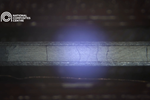Plataine expands NCC's AI, IoT optimization capabilities
Under this partnership, the NCC will leverage technologies such as time-sensitive material management and Plataine’s Digital Twin to further develop its composites R&D.

Source | Getty Images
The National Composites Centre (NCC, Bristol, U.K.) has announced next step in its partnership with AI-based optimization solutions provider Plataine (Waltham, Mass., U.S.). This collaboration marks NCC’s commitment to enhance the efficiency and sustainability of composite material management through digital transformation.
Established as the U.K.’s center of excellence for composites research and development (R&D), the NCC’s mission is to spearhead collaborative innovation and evaluation of cutting-edge composites and integrated digital technology to deliver positive impact on the U.K. industry.
Plataine’s time-sensitive material manager (TSMM), combined with RFID sensors, offers a comprehensive solution to help achieve the NCC’s goals. Plataine enables real-time tracking of materials from the receiving step throughout the entire production process, ensuring optimal in-factory management and reporting of time-sensitive materials while minimizing material expiration and scrap. RFID antennas pick up signals from tagged composite material items and automatically update their status and location. When fully integrated with other NCC systems, the solution has the potential to fully digitize material management and tracking, employing AI-based approaches to optimize selection for jobs based on properties, status and quality of material data to further reduce errors and waste, and enhance sustainability levels. In addition, real-time visibility of material location and status leads to efficient inventory management, enhanced quality control and compliance with aerocomposites industry standards.
Looking forward, consistent monitoring and management of an asset or material across its entire life cycle and across supply chains is critical for making optimal circularity decisions and performing life cycle analysis (LCA), a focus of the NCC’s combined digital and sustainability service. Plataine’s Digital Thread technology uses cloud-based technology that enables manufacturers to log the complete genealogy of a product, stretching across multiple sites and organizations, from raw material to finished part and could be a part of this developing system.
“As one of our flagship digital transformation projects, our new time-sensitive material tracking will enable us to produce parts more efficiently and with reduced material waste, while still upholding the highest quality standards,” Marc Funnell, head of digital engineering technologies at the NCC, says. “Our growing partnership with Plataine allows us to showcase and leverage expanding IOT, data science and AI technology, further developing the NCC’s commitment to be a digital exemplar and learning factory for the industry.”
According to Avner Ben-Bassat, president and CEO of Plataine, this venture is more than just a collaboration; it’s a commitment from Plataine to elevate the NCC to the status of a state-of-the-art standard for the entire U.K. industry. “Through this long-term partnership, we aspire to showcase the imperative value of advanced technologies in making industries more efficient, responsible and sustainable,” Ben-Bassat concludes.
Related Content
-
Aerotech Academy Puglia is inaugurated at Leonardo Aerospace site in Grottaglie, Italy
Joining the Leonardo MaTeRIA Lab and Joint Lab with Syensqo, this aerostructures training course will be 75% materials science and structural design/analysis, 25% digital transformation and AI.
-
Toray announces growth, investment in carbon fiber composite materials
As part of its 2023-2025 management strategy, Toray projects 42% growth for pressure vessels, 30% growth in carbon fiber composite materials revenue and a doubling of capital investment.
-
IMDEA introduces digital twin for real-time analysis of composite materials production
Newly designed digital twin by IMDEA and Technical University of Madrid researchers enables manufacturers to see inside composite materials as they are being produced, facilitating early detection of faults.
















